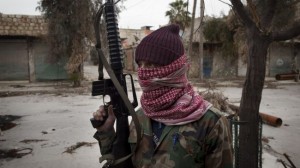 The plan, which will be discussed by Putin and the Iranian FM�on Monday, moots democratic transition in stages and expedited elections without Assad.
The plan, which will be discussed by Putin and the Iranian FM�on Monday, moots democratic transition in stages and expedited elections without Assad.While United States President Barack Obama and his Secretary of State John Kerry�continue their never-ending efforts�to convince the Congress and America's allies to support an attack on Syria, Iran and Russia are promoting a proposal for a diplomatic compromise that could prevent such an attack.
The details of the proposal are not known, but it was discussed by Ala Al-Din Boroujerdi, the chairman of�Iran's Parliamentary Committee for National Security and Foreign Policy, and his Syrian interlocutors a few days ago. Reports in the Arab and Iranian media say Syrian Foreign Minister Walid al-Muallem is expected to present the proposal to Russian President Vladimir Putin when the two meet�on Monday. The proposal includes a plan for a "democratic transfer" of power in stages. This seems to be an improved version of the proposal presented in the past, according to which elections for the president of Syria will be expedited and President Bashar Assad will not run again .
In another proposal, which was�reported in Haaretz�last week, Syria will agree to completely remove its inventory of chemical weapons from the country and transfer it to Russia or another country. This proposal is also expected to be discussed in the meeting between Putin and al-Muallem. Other reports say al-Muallem will ask Putin for permission to move Scud and other missiles to the Russian naval base in Tartus, to protect them from the American attack. It is possible that the chemical weapons stores will also be moved to this base.
Iran, which is stepping up its efforts to prevent an American attack on Syria, has drastically changed the tone of its public statements. Iranian Foreign Minister Mohammad Javad Zarif reportedly said last week: �We believe that the government in Syria has made grave mistakes that have, unfortunately, paved the way for the situation in the country to be abused.� There are those who see Zarif's statement as reinforcement for the view that the recent use of chemical weapons in Syria exceeded the scope of what the regime had planned.
Important Iranian commentators have called in recent days for the Iranian leadership to prevent the Syrian crisis from creeping into Iranian territory and for the Iranian government to �first take care of the interests of Iranian citizens." These same commentators note that fear of an American attack on Syria would force Iran to stand by Syria, thus thwarting hopes to advance plans for reform that require agreement between Iran and the U.S. The Iraqi newspaper Zaman quoted sources as saying that Iran had made it clear to Syria that it would not participate in a military operation in the event of an American attack; and Iranian Defense Minister Gen. Hossein�Dehghan stated that Iran did not intend to send troops or arms to Syria, since Syria does not need aid.
These statements may also testify to the feeling in Iran that Syria is becoming a burden on Iran's regional policies. Nonetheless, Iran is still making an effort to prove that radical Islamist forces operating in Syria are the ones who used the chemical weapons. Zarif revealed in an interview this week with the Iranian Aseman Weekly that Iran delivered information to the U.S. a few months ago that chemical weapons were entering Syria and radical groups might be planning to use them. Zarif did not provide details of who the information was given to or what the American response was, but former Iranian Intelligence Minister Omed Haider Musalhi revealed that two months ago Iran had passed information on the entry of chemical agents into Syria to human rights groups, "but they did nothing with the information."
At the same time, it seems that even the Syrian opposition is showing little enthusiasm for an American attack in Syria and, despite the high state of alert of the Free Syrian Army, it has no orderly plans for exploiting an American attack for its own tactical uses. One of the leading opposition figures, Prof. Burhan Ghalioun, published an original, concrete proposal�Sunday, when, in an open letter to Russian President Vladimir Putin, he proposed a barter agreement according to which Russia would remove Assad, his officials and his family and, in return, the opposition would ask the U.S. not to attack Syria. Ghalioun said that the opposition would fight against the attack, if the U.S. did not agree to the offer. Ghalioun said the offer would preserve Putin's honor and prevent him the embarrassment of not supporting Assad. In addition, it would also leave Russia with some its interests in Syria intact after the fall of the Assad regime.
Ghalioun�s statements represent the thinking of many Syrian opposition leaders, who are concerned that an American attack on Syria could extend the infighting between the sides, lead to a large number of dead and stain the rebellion in Syria with cooperation with foreign armies, while making no contribution to a diplomatic solution. With the American sword hanging over Assad�s head, the expectation now is that the talks between Putin and Muallem and between Iran and Syria have only a small window of opportunity; a few days for the threat of attack to be carried out, or for the sword to be returned to its scabbard and the threat revealed as barren.
By Haaretz
The Iran Project is not responsible for the content of quoted articles.










